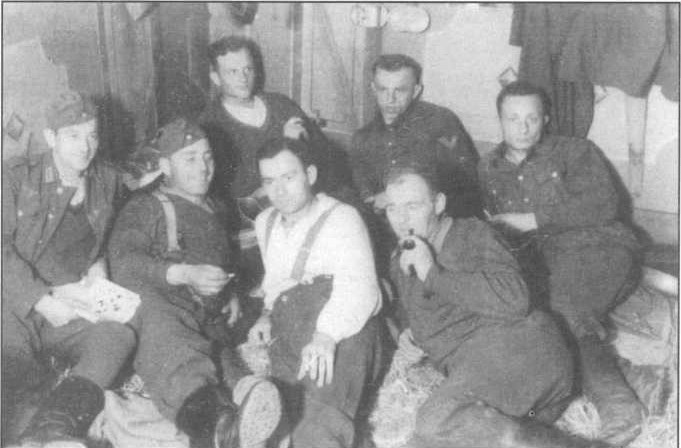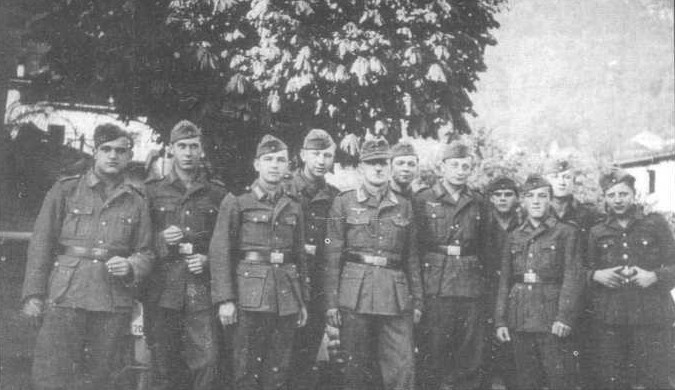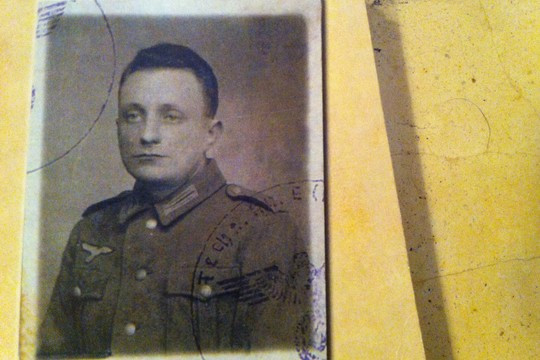Imagine being told that your grandfather was a Jewish Soviet spy who infiltrated a Nazi army unit during World War II. It sounds like fiction, doesn’t it? But this is the astonishing true story of Jacob Ingerman, a man who lived this unbelievable reality, recently brought to light in the English e-book, ‘A Jew in the ‘Service’ of the Reich.’
Jacob Ingerman’s story is almost too incredible to believe. He was a Jewish man who donned the German Ww2 Uniform of the enemy for three long years, all while secretly serving as a Soviet spy. Picture this: he marched across Ukraine, Poland, Germany, and Italy as part of a German army unit, simultaneously building underground resistance cells and funneling crucial intelligence and weapons to partisans, Jewish communities, and the Red Army. He navigated treacherous encounters with Gestapo agents, constantly risked exposure of his Jewish identity by avoiding medical exams, and even found romance with socialist activists across war-torn Europe. It sounds like a movie script, but it was his life.
It’s a narrative that stretches the boundaries of credibility, unless you knew Jacob Ingerman.
 German soldiers and Jacob Ingerman (upper right) in Ukraine
German soldiers and Jacob Ingerman (upper right) in Ukraine
German soldiers pictured with Jacob Ingerman, positioned at the upper right, during their deployment in Ukraine.
This remarkable story is being shared now as Jacob Ingerman’s Hebrew memoir has been translated and published as an e-book in English, available for purchase here.
Born in Ukraine to a religious family, Jacob Ingerman grew into a committed communist and political activist in the USSR. After earning a mathematics degree, he became a teacher. When Germany invaded, he joined the Soviet army and was wounded in action. This marked the start of his extraordinary journey into espionage.
Following his recovery, Jacob underwent specialized intelligence training. This included not only language skills in German but also cultural nuances like German table manners and ballroom dancing – preparing him to convincingly blend in. He was then parachuted behind enemy lines in Ukraine with a fabricated German identity. Within days, he had befriended German soldiers and learned about a planned tank division movement across a nearby bridge. This vital information was relayed, and the bridge, along with a significant number of German tanks, was destroyed in a bombardment, disrupting the Nazi advance into the USSR.
“We notified the women prisoners’ leaders of the evolving plan and arranged with them to determine a list of the women to be freed… We agreed that their liberation would happen after I finished my nightly guard duty, so that I would not be suspected. According to the plan, I was to open all the locks during my shift and with the changing of the guard, the Underground people would steal into the compound and extricate the women. We coordinated all the details with the women’s leaders, mainly those who cleaned our offices and with whom I had ongoing contact [from A Jew in the “Service” of the Reich].”
 Jacob Ingerman (on the left) with troops fleeing the Red Army
Jacob Ingerman (on the left) with troops fleeing the Red Army
Jacob Ingerman, pictured on the left side, among troops retreating from the Red Army.
At just 23, Jacob became the translator for a German electric engineering unit, a position he held throughout the war. This role took him through numerous villages and towns, where he acted as a communication bridge between the German unit and the local occupied population. Crucially, he used these interactions to establish and expand resistance cells, even within the German army itself. His clandestine activities continued even when he was temporarily assigned as a translator for the Gestapo, a harrowing role that involved witnessing and participating in interrogations, including torture.
His primary mission was intelligence gathering and transmission, but Jacob consistently went further. He risked his life to steal weapons, providing them to partisans fighting in the forests and to Jewish people living in terror under German occupation. He orchestrated the liberation of captives and even sabotaged his own unit’s attempts to destroy a power plant during a retreat. Throughout this perilous period, Jacob had to maintain a dual facade: concealing his underground work and his anti-fascist convictions, and, most critically, hiding his Jewish identity. The constant fear of exposure during routine activities like communal showers or monthly STD checks was an ever-present burden. Wearing the german ww2 uniform was not just a disguise; it was a mask he had to wear perfectly to survive.
A Humanist in Nazi Ranks
Jacob’s story, while sounding fictional, becomes believable when you understand his character. He was known for his exceptional warmth, friendliness, and likeability. He had an extraordinary ability to connect with people almost instantly. This was rooted in what could be called a “political humanism,” or more accurately, “mensch-ism.” He possessed a deep love for humanity, which, combined with his political ideals, drove his communism. Conversely, his communism was expressed through a profound love for people, always seeking the best in them – a stark contrast to the oppressive communist regime he grew up in.
This inherent humanism allowed him to quickly gain the trust of many soldiers in his unit. So much so that during their first Christmas together, they shared their gifts from home – alcohol, sweets, coffee – with him as a gesture of camaraderie. His commanding officer even considered adopting him and finding him a German wife!
Throughout his book, Jacob emphasizes the distinction between the few ideologically driven Nazis he encountered and the majority of German soldiers. He saw most as ordinary men, non-political, and simply caught up in the war. While he could never connect with the staunch Nazis, he found common ground with the everyday soldiers.
“On the designated night, I carried out my assignment and after the guard change I went to bed… but, of course I could not sleep. Before the operation, I’d been full of anxiety in case some unexpected fault was discovered. The German guards would carry out their watch in high boots which had a thick wooden sole, which inhibited their movement. Because of the extreme cold at night, they also wore long, heavy, fur coats. Since they could only move laboriously, the actual guarding was reduced to standing at the entrance. But the guards were armed and nervous… and it was hard to foresee what their reaction would be.
The two partisans who were responsible for carrying out the plan entered the camp during my watch, and hid. When I finished my shift, they waited a while to enable me to get clear and then jumped the guard, stuffed his mouth with a gag and covered his head with a sack. As planned, they didn’t kill him, just neutralized him [from A Jew in the “Service” of the Reich].”
 Jaboc Interman (fifth from the right) with Polish soldiers
Jaboc Interman (fifth from the right) with Polish soldiers
Jacob Ingerman, positioned fifth from the right, pictured alongside Polish soldiers.
As the war concluded, Jacob’s unit was stationed in Italy and surrendered to British and American forces. Instead of returning to the USSR as initially planned, he journeyed to Palestine and joined the nascent Israeli state’s intelligence network. He and his wife, Shula, were even awarded the Israel Defense Prize. Yet, he remained a communist and a humanist throughout his life, increasingly concerned by the political trajectory of the state he helped to build.
Adding another layer to his already risky existence, Jacob openly read Heinrich Heine, a Jewish-German author whose books were burned by the Nazis. This act of defiance in reading forbidden literature astonished his fellow soldiers, yet he survived even this. When he passed away seven years ago, a Heine quote was inscribed on his gravestone as a tribute to his spirit. He is deeply missed.
A Jew in the “Service” of the Reich, by Jacob Ingerman, is available as an e-book on Amazon, and in Hebrew on Mendele.
***
The Successful Escape
“They then extricated the women from the prison and opened the gate nearest the sea. At the time, cracks were beginning to appear in the ice and it was dangerous to walk on it. But the partisans knew all the risky sections very well and led the women on a sure path. Sleds were waiting to transfer them to the Russian side of the Azov Sea, some thirty meters from the compound.
The entire operation to release the women took no longer than half an hour. Only when the next guard came on duty, some two hours later, was his predecessor found wrapped in a sack and the compound broken into and open. He sounded the alarm, a panic started and we all hurried to the yard to see what had happened. We discovered footprints in the snow leading across the sea. Since the company numbered so few men, no attempt was made to follow the trail of the escapees. The Gestapo came to investigate the affair at dawn. They surveyed the area near the sea, but didn’t dare risk walking on the ice. They feared drowning, or being captured by the Soviet forces. One of the Gestapo concluded, “It’s not worth the risk for a bunch of Russian women.”
The affair succeeded beyond all measure. We managed to free about eighty women out of over two hundred. Several months after this action I received a medal. We thought about repeating the deed and releasing the rest of the women, but this never came to pass. The Red Army beat us to it and liberated Mariupol [from A Jew in the “Service” of the Reich].”
 My grandfather, Jacob Ingerman, in German uniforms
My grandfather, Jacob Ingerman, in German uniforms
A striking image of Jacob Ingerman, the author’s grandfather, proudly wearing his German uniform during World War II.
